Day 5: Recognizing Internalized Oppression in Ourselves
Today’s session in 100 Days of Community took us deeper into the heart of liberation work as we explored Recognizing Internalized Oppression in Ourselves. Internalized oppression operates as an invisible force, shaping how we see ourselves, how we engage with others, and how we participate in the systems around us. It’s learned, not innate, and it thrives on the cultural narratives that supremacy culture instills in us.
Unlearning these oppressive systems is both deeply personal and inherently communal. Together, we reflected on what it means to uncover the ways we’ve absorbed harmful beliefs, how to begin healing, and why this process must be rooted in collective liberation.
Key Takeaways
Internalized Oppression is Learned, Not Innate
Supremacy culture teaches us to devalue ourselves and conform to harmful systems, whether through assimilation, self-doubt, or anti-marginalized identity sentiments. These internalized beliefs affect marginalized and privileged groups differently but harm us all.Awareness is the First Step to Liberation
Recognizing the ways we’ve absorbed oppressive beliefs allows us to disrupt their influence. This work requires gentleness, compassion, and a willingness to confront uncomfortable truths about ourselves.Liberation is a Collective Process
Individual work is important, but it’s not enough. True healing happens in community spaces where we can be vulnerable, honest, and supported in our journey to unlearn and rebuild.
Highlights from Our Conversation
The Progress of 100 Days of Community
I reflected on the incredible progress we’ve made together in this series. The feedback, engagement, and willingness to show up authentically have already set a powerful foundation for what’s to come. I shared my intention for this work: to create a space where learning, healing, and community building can flourish.
Internalized Oppression and Marginalized Identity
We explored how systems of supremacy force conformity and create a monolith, erasing individuality and cultural nuance. For marginalized groups, this manifests in anti-blackness, anti-Jewish sentiment, and internalized self-doubt. For white-bodied people, it often looks like imposter syndrome and disconnection from ancestral wisdom. These forces dehumanize everyone, perpetuating cycles of harm and disconnection.
Unlearning Oppressive Systems and Ancestral Healing
Awareness of internalized oppression is the first step toward unlearning these systems. But awareness alone isn’t enough—we must also engage in practices of healing and reclamation. This includes confronting the past, embracing ancestral wisdom, and unlearning harmful cultural narratives. I shared my experience as a Black woman with Irish heritage and how reclaiming both sides of my ancestry has been a vital part of my liberation journey.
Community as a Healing Space
Liberation isn’t work we can do alone. Individual therapy is powerful, but it must be paired with communal healing spaces to create holistic change. I shared examples of communal healing within my own family and emphasized the importance of building intentional spaces where we can collectively address harm, hold each other accountable, and rebuild trust.
Reframing Identity and Action
We ended with a discussion on identity and performative actions. I introduced the concept of "there are no good white people" as a way to shift from performative allyship to genuine work. This is not a dismissal of effort but an invitation to stop seeking external validation and focus on dismantling oppressive systems authentically and collectively.
Reflection Points
What beliefs about yourself or others have you internalized from supremacy culture? How do these beliefs show up in your daily life?
Where in your life could you invite more gentleness and compassion as you begin unlearning oppressive systems?
What does collective liberation mean to you? How can you contribute to communal healing?
Journal Prompts
Reflect on a moment when internalized oppression influenced your choices. What did you believe about yourself, and how might you shift that narrative now?
Write about your relationship to your ancestry. What parts of your heritage feel empowering, and what parts feel disconnected or painful?
Envision a community that supports healing and unlearning. What does that look like, and how can you help create it?
Actionable Steps
Download the Ebook + Infographic: Learn more about the 15 pillars of supremacy culture and how they manifest. My ebook, Dismantling Supremacy Culture: Understanding and Overcoming Its 15 Pillars, is Pay What You Can and includes a printable infographic. Download it here.
Explore Dialogue Resources: Check out Grow Dialogue’s Authentic Dialogue Resources by Dr. Sundiata for tools to foster connection and healing in your communities.
Practice Communal Healing: Start or join a group where you can explore these topics together. Intentional, intersectional spaces create room for accountability, support, and growth.
I Highly recommend Myisha T Hills’ community. You can find out more about her on IG and see if she resonates with you, the community is very interactive.
I also host Facebook communities tailored to different aspects of liberation work:
Self: The Make Shi(f)t Happen Social Matters group focuses on personal growth, self-reflection, and individual healing practices.
Work: The Intersectional Allies for Transformation group is designed for those committed to dismantling supremacy culture in professional spaces.
Home: The Conscious Parenting for Social Justice group, co-hosted with Yolanda Williams of Parenting Decolonized, provides a space to explore decolonized parenting and family dynamics.
Looking Ahead: Day 6 Preview
Tomorrow, we’ll explore Naming and Addressing Privilege in Community. We’ll dive into how privilege operates within systems, how to recognize it in ourselves, and how we can leverage it for collective liberation.
Reminder
The first 10 days of 100 Days of Community are free, but access will transition to paid subscribers after that. Right now, you can get 20% off the annual subscription ($80).
If financial barriers exist, please email scholarships@desireebstephens.com for a comped subscription.
Thank you for showing up to do this deep, necessary work. Together, we’re building spaces where healing, unlearning, and liberation can thrive.
In solidarity and liberation,
Desireé B. Stephens
Educator | Counselor | Community Builder
Founder, Make Shi(f)t Happen
Thank you
, , and many others for tuning into my live video! Join me tomorrow at 9:30 am EST for my next live video in the app.



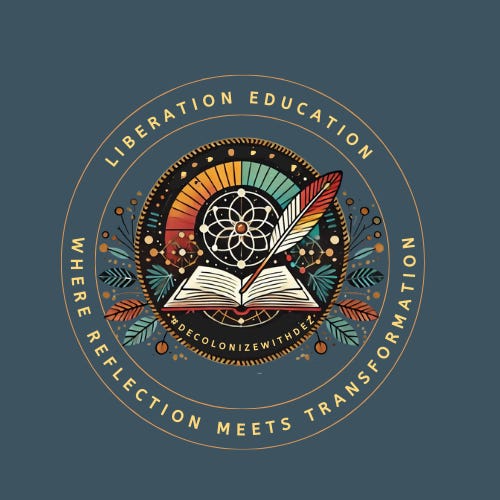

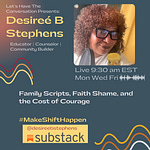


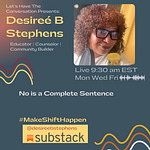

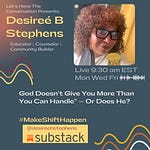
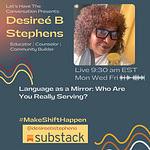
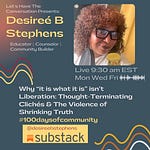
Share this post